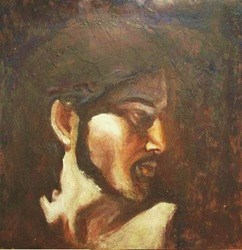
The First Beatitude
The Greeks were dedicated to sports, and they permitted free men of any social class to compete in the Olympic games. Athletes were highly regarded in their society. Kings could compete against blacksmiths or wealthy landowners against merchants. Their lore told them that the Olympic games were established by the gods and the mighty hero Hercules. To excel in the Olympic games was to enjoy the favor of the gods--or to beome a hero: in a sense, godlike.
One aspect of the Beatitudes that is difficult to convey is the humor and intricacy of the word play Jesus used in the Greek. The first Beatitude starts out: "Blessed are the poor in spirit . . ."
The very wealthiest and most influential in Greek society--those who excelled--the best of the best, or as they thought,the most favored by the gods--were described as "makarioi." This is the same word that Jesus used for "blessed."
The Greek word, "pneuma," similar to the Hebrew word, "ruach," meant air, spirit, or breath. To be lacking air, as the Beatitude suggests, in the context of health or illness would equate to being short of breath.
One paraphrase might be, "Most greatly favored are the short of breath:" in Olympic terms, losers. The short of breath not only wouldn't have won, they may not even have finished the race.
So why does Jesus call them favored?
". . . For theirs is the kingdom of Heaven." I'd like to look at that phrase in the Greek--belonging to the Kingdom of Heaven is the equivalent of being a citizen of the sky. We have to bear in mind that ouranos means both heaven and sky, but in the spiritual sense "air" refers here to spirit. Where is there more air than in the sky? In case you missed the pun, Jesus is offering us all the air (spirit) anyone can breathe, and more.
What are the poor in spirit experiencing, in spiritual terms? They aren't spectators, or they wouldn't be out of breath. They're in there, trying. They are giving their best to the competition but it just isn't enough. They don't have what it takes and when they have to fall out of the race, they realize that. They aren't going to become heroes or gods thanks to their own efforts. We would say, "they're only human."
But Jesus would say that's what makes them his favorites.
They are not full of themselves. Whatever their failings, they do not have an ego that would prevent them from relying on Jesus. "I can do all things--through Christ, who strengthens me." *
This establishes a theme that repeats thoughout the Beatitudes: Jesus never tells us what we expect to hear. He doesn't just say, "There, there. Poor human, you'll get through this somehow. You'll feel better tomorrow. Keep trying." He avoids superficial philosophical palliatives. He consistently offers something much better--an advancing relationship with divinity, in return for facing the worst conditions humans can endure.
There are two reasons Christ can offer these counterintuitive consolations: first, because he lived through each of these difficult human predicaments himself. Because he is divine yet he walked in the way of humanity, each step we take on the steep path of human experience brings us into God's presence. The second reason he can list these inexplicable, irrational consequences is because he declared them to be so. The Hebrew concept of blessing is, "to vocally call into existence the power for something to become what it was meant to be." If Christ were only human, we would perhaps complain his blessings sound like the incantations of a magician. But since he is also Divine, to us they sound like the Creator speaking his will with power. And so they are.
*The emphasis here is mine.
Click here for a look at the Second Beatitude.

 RSS Feed
RSS Feed
